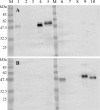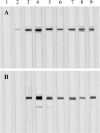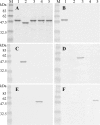Species-specific antibody responses to the recombinant 53-kilodalton excretory and secretory proteins in mice infected with Trichinella spp
- PMID: 18184826
- PMCID: PMC2268267
- DOI: 10.1128/CVI.00467-07
Species-specific antibody responses to the recombinant 53-kilodalton excretory and secretory proteins in mice infected with Trichinella spp
Abstract
The 53-kDa proteins in larval excretory and secretory (E-S) products were expressed from five Trichinella species (T. spiralis, T. britovi, T. nativa, T. pseudospiralis, and T. papuae), using the Escherichia coli expression system, and the antibody responses to the 53-kDa recombinant proteins in mice infected with Trichinella spp. were analyzed by Western blotting. The 53-kDa protein is conserved among the five Trichinella species, with >60% similarity in amino acid sequences. The 53-kDa recombinant proteins of T. spiralis and T. pseudospiralis reacted to sera from mice infected with T. spiralis and T. pseudospiralis at 8 days postinfection (p.i.), respectively. An antibody against the 53-kDa recombinant protein of T. spiralis recognized the 53-kDa protein in the crude extracts from adult worms and 30-day p.i. muscle larvae and E-S products from muscle larvae of T. spiralis but did not recognize any proteins from T. pseudospiralis. The sera from the mice infected with T. spiralis strongly reacted with the 53-kDa recombinant protein of T. spiralis but did not react with the 53-kDa recombinant proteins of T. britovi, T. nativa, T. pseudospiralis, and T. papuae. Similarly, the sera from mice infected with T. britovi, T. nativa, T. pseudospiralis, or T. papuae strongly reacted with the 53-kDa recombinant proteins of T. britovi, T. nativa, T. pseudospiralis, or T. papuae, respectively. These results showed that the 53-kDa recombinant proteins provide early and species-specific antibody responses in mice infected with Trichinella spp.
Figures




Similar articles
-
Differentiation of Trichinella species (Trichinella spiralis/Trichinella britovi versus Trichinella pseudospiralis) using western blot.Parasit Vectors. 2018 Dec 12;11(1):631. doi: 10.1186/s13071-018-3244-3. Parasit Vectors. 2018. PMID: 30541617 Free PMC article.
-
Acute phase protein pattern and antibody response in pigs experimentally infected with a moderate dose of Trichinella spiralis, T. britovi, and T. pseudospiralis.Vet Parasitol. 2020 Dec;288:109277. doi: 10.1016/j.vetpar.2020.109277. Epub 2020 Oct 22. Vet Parasitol. 2020. PMID: 33130498
-
Partially Protective Immunity Induced by a 20 kDa Protein Secreted by Trichinella spiralis Stichocytes.PLoS One. 2015 Aug 19;10(8):e0136189. doi: 10.1371/journal.pone.0136189. eCollection 2015. PLoS One. 2015. PMID: 26288365 Free PMC article.
-
Biological variation in Trichinella species and genotypes.J Helminthol. 2003 Jun;77(2):111-8. doi: 10.1079/JOH2003170. J Helminthol. 2003. PMID: 12756064 Review.
-
[Biology, species biodiversity and distribution of Trichinella nematodes].Wiad Parazytol. 2006;52(3):157-64. Wiad Parazytol. 2006. PMID: 17432238 Review. Polish.
Cited by
-
Trichinella pseudospiralis-secreted 53 kDa protein ameliorates imiquimod-induced psoriasis by inhibiting the IL-23/IL-17 axis in mice.Biochem Biophys Rep. 2022 Dec 27;33:101415. doi: 10.1016/j.bbrep.2022.101415. eCollection 2023 Mar. Biochem Biophys Rep. 2022. PMID: 36620087 Free PMC article.
-
The Use of Recombinant 31 kDa Antigens of Trichinella spiralis for Serodiagnosis of Experimental Trichinellosis.Iran J Parasitol. 2015 Apr-Jun;10(2):230-7. Iran J Parasitol. 2015. PMID: 26246820 Free PMC article.
-
Advancing a multivalent 'Pan-anthelmintic' vaccine against soil-transmitted nematode infections.Expert Rev Vaccines. 2014 Mar;13(3):321-31. doi: 10.1586/14760584.2014.872035. Epub 2014 Jan 6. Expert Rev Vaccines. 2014. PMID: 24392641 Free PMC article. Review.
-
Immuno-proteomic analysis of Trichinella spiralis, T. pseudospiralis, and T. papuae extracts recognized by human T. spiralis-infected sera.Parasitol Res. 2018 Jan;117(1):201-212. doi: 10.1007/s00436-017-5694-5. Epub 2017 Nov 30. Parasitol Res. 2018. PMID: 29189952
-
Human trichinosis after consumption of soft-shelled turtles, Taiwan.Emerg Infect Dis. 2009 Dec;15(12):2056-8. doi: 10.3201/eid1512.090619. Emerg Infect Dis. 2009. PMID: 19961701 Free PMC article.
References
-
- Colangeli, R., A. Heijbel, A. M. Williams, C. Manca, J. Chan, K. Lyashchenko, and M. L. Gennaro. 1998. Three-step purification of lipopolysaccharide-free, polyhistidine-tagged recombinant antigens of Mycobacterium tuberculosis. J. Chromatogr. B 714:223-235. - PubMed
-
- de la Rosa, J. L., P. Alcántara, and D. Correa. 1995. Investigation of cross-reactions against Trichinella spiralis antigens by enzyme-linked immunosorbent assay and enzyme-linked immunoelectrotransfer blot assay in patients with various diseases. Clin. Diagn. Lab. Immunol. 2:122-124. - PMC - PubMed
-
- Denkers, E. Y., D. L. Wassom, C. J. Krco, and C. E. Hayes. 1990. The mouse antibody response to Trichinella spiralis defines a single, immunodominant epitope shared by multiple antigens. J. Immunol. 144:3152-3159. - PubMed
-
- Dupouy-Camet, J. 2000. Trichinellosis: a worldwide zoonosis. Vet. Parasitol. 93:191-200. - PubMed
MeSH terms
Substances
Associated data
- Actions
- Actions
LinkOut - more resources
Full Text Sources
Miscellaneous

